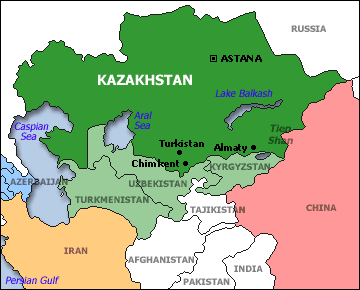 A senior U.S. official will travel to two countries in Central Asia next week to emphasize U.S. support for the independence of post-Soviet states after Russia's annexation of Crimea. Assistant Secretary of State Nisha Biswal, Washington's point person for South and Central Asia, will visit Kazakhstan from March 31 to April 2 and Kyrgyzstan from April 2-4.
A senior U.S. official will travel to two countries in Central Asia next week to emphasize U.S. support for the independence of post-Soviet states after Russia's annexation of Crimea. Assistant Secretary of State Nisha Biswal, Washington's point person for South and Central Asia, will visit Kazakhstan from March 31 to April 2 and Kyrgyzstan from April 2-4.
"In both countries Assistant Secretary Biswal will re-affirm the U.S. commitment to continued engagement and partnership with the countries of the region for stability and prosperity," the State Department said in a statement.
A State Department official added that would "affirm our support for the sovereignty and territorial integrity of both countries and for all post-Soviet states."
The U.S. visit will come two weeks after Russian President Vladimir Putin's annexation of the Crimea region of Ukraine, another former Soviet state.
Putin is now expected to turn to the autocrats of Central Asia, particularly Kazakhstan's Nursultan Nazarbayev, to further his aim of erecting a Eurasian Union of former Soviet states.
Kazakhstan is one of two ex-Soviet states, along with Belarus, that has joined a customs union with Russia. Members plan to sign documents this year to form the Eurasian Economic Union, a regional bloc within former Soviet borders intended eventually as a counterweight to the European Union.
While the other four former Soviet republics in Central Asia - Tajikistan, Turkmenistan, Uzbekistan and Kyrgyzstan - will not be founder members of the new body, all are likely to be drawn closer into Moscow's orbit as it restores influence in a region it ruled for most of the 19th and 20th centuries.
The U.S. State Department official said all countries had the right to choose their own development paths and added: "No country has the right to determine the political and economic orientation of another country, nor decide which alliances and trade agreements it can join."
The Central Asian states have so far responded to the events in Ukraine by staying silent or issuing cautiously worded statements to avoid irking Moscow.
Kazakhstan's Nazarbayev told Putin on March 10 he "understands" Moscow's stance on Crimea. He said on Tuesday work on the Eurasian Economic Union would continue. However, he also felt the need to point out that his country has no intention of once again falling under Moscow's rule.
In late 1991, the United States became the first country to recognize Kazakhstan's independence after the dissolution of the Soviet Union. U.S. firms have significant investments in the country's oil and gas sector, but the Kazakh economy has remained closely intertwined with Moscow's.
Kazakhstan's much poorer regional neighbors Tajikistan and Kyrgyzstan are both firmly in Moscow's orbit and have expressed their willingness to join the customs union, but due to their dire economic plight it may take years before they can join.
(Reporting by David Brunnstrom; Editing by Sandra Maler and Chizu Nomiyama)
WASHINGTON (Reuters)




